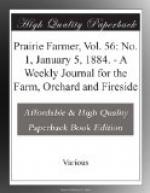Dr. Schroeder, member of the committee on pear culture, made no formal report, but in brief remarks urged the general planting and raising of the kind of fruit as being profitable and productive. Mr. Samuel Edwards, of Mendota, chairman of committee on currants, read a very interesting report on currants and gooseberries, in which it appeared that the cultivation of this fruit was neglected and was on the decline. Dr. A.L. Small, of Kankakee, made a report on plums, in which he recommended the general planting of this fruit, he making a specialty of plum trees, and regarded the plum as a fruit that was coming more in demand and popular, and one that readily adapts itself to the many kinds of climates and soils.
Mr. Weir also read a paper on plums and plum culture. He recommended the Chickasaw because it is hardy and not liable to have its blossoms injured by a late spring, like many fruits. He named the Newman and Wild Goose among other so-called seedlings that were very good. He expressed the opinion that there was but one distinct species of plum in the United States.
FLORICULTURE.
Mrs. Mary J. Barnard, of Manteno, from the committee on floriculture, strongly urged the cultivation of house-plants, not only as beautifiers, but to give the most pleasant occupation to every lady of the family. She referred to the earlier flowers of summer especially—the crocus, snow-drop, lily of the valley, tulips. Next to these came the annuals; with little trouble these could be had for months. The wild flowers of the prairies were spoken of, and she suggested that we should obtain seed of the flowers and raise such as we wish. The paper was a good one and was well received. Mr. Baller, a florist of Bloomington, said that of late the demand for plants had fallen off. The reason given was that there was an increased general knowledge among the people. At the present, the chief demands are for hot-house, cut flowers, and monthlies. The reason given for the falling off of the demand for plants was the fact that plants were more easily raised since the introduction of base-burners. This, he thought, could be still further increased by having a double sash, and the building of bay windows on the south and east of the houses. He reported, however, that there was still a good market for hot-house flowers among the rich for decorating purposes, funerals, etc.
THE PRAIRIE FARMER will, from time to time, consider other papers and discussions at this meeting, for there was much more of interest said and done than can be condensed into a simple running report. We advise farmers to send one dollar to the Secretary and receive therefor a copy of the Transactions when issued.




